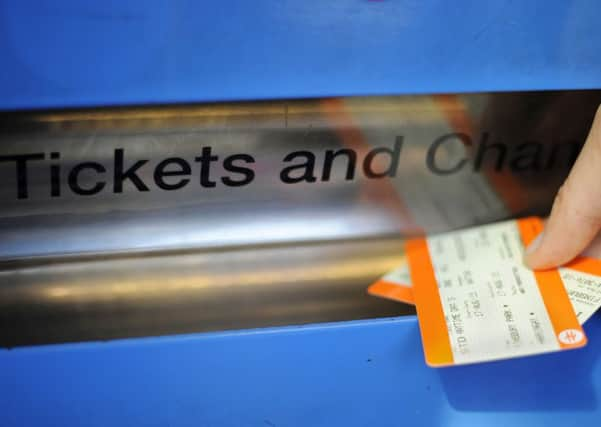Government urged to reduce Southern rail fares as price rise looms


The increase is linked to July’s Retail Price Index (RPI) measure of inflation, which was announced by the Office for National Statistics today.
Rail minister Paul Maynard said passengers “ want more reliable journeys in comfort and with better facilities”.
Advertisement
Hide AdAdvertisement
Hide AdBut a number of politicians and campaigners believe it would be unfair for commuters using embattled operator Southern to pay more for their tickets.
Many of the firm’s services have been delayed or cancelled for months because of a dispute over changes to the role of conductors and staff shortages - blamed by the company on high levels of employee sickness.
Tory MP Crispin Blunt, whose Reigate constituency is on the Southern network, said: “The Government has got to treat people fairly.
“An across the board regulated rise with no exceptions to Southern is unconscionable.”
Advertisement
Hide AdAdvertisement
Hide AdHe told the Press Association that ministers should reduce fares for Southern passengers until rebuilding work at London Bridge is completed in January 2018, as the project has contributed to delays across the network.
“There should be a cut for Southern passengers until the service returns to normal,” he added.
London Mayor Sadiq Khan, who has frozen Transport for London (TfL) fares for single journeys, called on the Government to halt any increase in ticket prices on suburban rail routes and speed up the transfer of the services to TfL.
He said: “This further hike in fares at a time when many commuters are facing a disgraceful service is yet another kick in the teeth.”
Advertisement
Hide AdAdvertisement
Hide AdGreen Party MP Caroline Lucas said the increase in ticket prices would be “particularly galling” for commuters using Southern Railway, who are “ paying growing amounts for a deteriorating service”.
Around half of rail fares are regulated, including season tickets on most commuter journeys, some off-peak return tickets on long distance trips and Anytime tickets around major cities.
Transport Focus, Railfuture and the Campaign for Better Transport all called on ministers to use the Consumer Price Index (CPI) measure of inflation for setting fares, rather than RPI.
CPI, which was 0.6% in July, is used for calculating pensions and most benefits.
Advertisement
Hide AdAdvertisement
Hide AdAlex Neill, director of policy and campaigns at consumer group Which?, commented: “ It’s little wonder that trust in train companies is falling when passengers face cancellations, delays and disruption yet see fares continue to rise.”
Research by the TUC and the Action For Rail union campaign showed that fares have risen by double the speed of wages since 2010.
The analysis revealed that fares have increased by 25% in the last six years, while average weekly earnings have grown by 12%.
A series of protests were held at railway stations across the country by trade unions on Tuesday morning.
Advertisement
Hide AdAdvertisement
Hide AdLabour leader Jeremy Corbyn held a placard which read “2017 rip off central” at a demonstration outside London Bridge station.
Asked how much it would cost to implement his policy of renationalising the railways, he replied: “The cost would be not very much because we would be taking over the franchises as they ran out and handing them over to direct rail to run as train companies.”
As fares for passengers rise, dividends paid to shareholders of private train companies have risen by 21% in the last year to £222 million, according to the unions.
TUC general secretary Frances O’Grady said: “ It’s time for rail services to be publicly owned, saving money for passengers and taxpayers alike.
Advertisement
Hide AdAdvertisement
Hide Ad“Instead of increasing fares and cutting staff, we should be building an accessible, reliable train service that Britain can be proud of.”
But Mr Maynard insisted that “wages are growing faster than train ticket prices”.
He went on: “ Passengers want more reliable journeys in comfort and with better facilities. That is why we are investing record amounts in our railways, delivering the biggest rail modernisation programme for over a century, providing more seats, more services, wi-fi and air conditioning.”
Paul Plummer, chief executive at the Rail Delivery Group, representing train operators and Network Rail, said: “I ncreases to season tickets are set by Government. For every pound paid in fares, 97p goes back into running and improving services and it’s our job to make sure that money is spent well.”